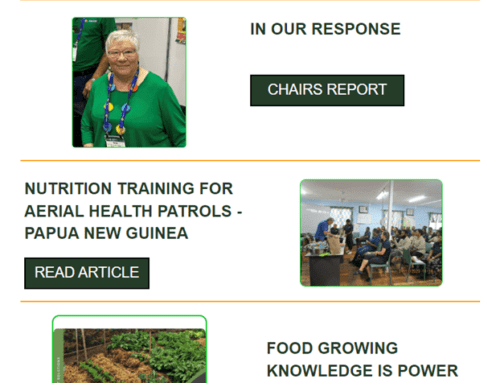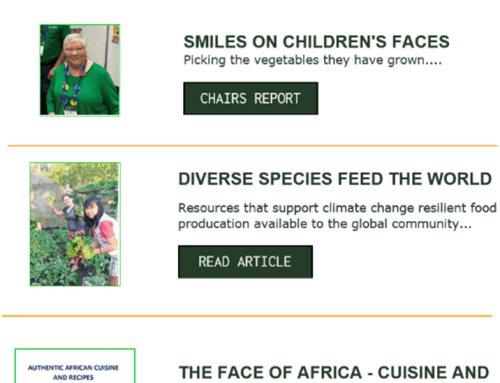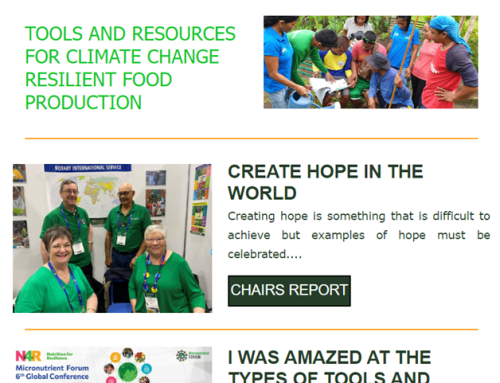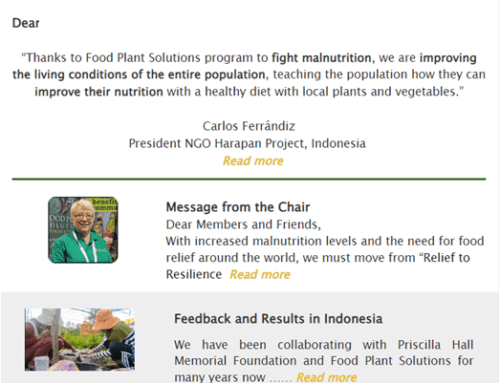In this edition we discuss the important role a nutritious diet has on our immune system.
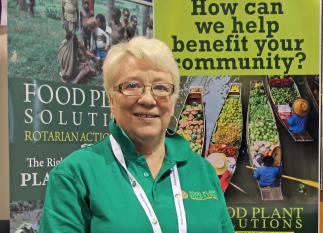
Message from the Chair
As I was planting seeds today for my winter vegetables I was thinking about all the things people who are self-isolating will need. Families will still need a good diet and exercise to get through this time. Those in the community with very small places to grow their vegetables will also need some help to do this, to enable their families to maintain good nutrition levels. So what could we all do?
Rotary Clubs who have members that are handy with tools could perhaps build some vegetable boxes ready to be delivered to homes of the elderly or people in units. We have a publication called ‘Fresh Foods for Families’ that has lots of ideas for people planting in small spaces, e.g. how to make paper pots for seeds to grow, how to plant in pots and troughs, which can be downloaded from our website. I am sure there are many other ideas that clubs have thought about, and I know many clubs are supporting their communities in many practical ways. Thank you.
Further in this newsletter is some information from our program partner in the Philippines – The Muravah Foundation, about what they are doing in this time of isolation. Now more than ever, everyone needs access to good nutritious food for a healthy immune system.
“Rotary Connects the world” remains a core theme in our world and we will get through this together.
Stay safe.
PDG Una Hobday OAM, PHF
Chair – Food Plant Solutions RAG
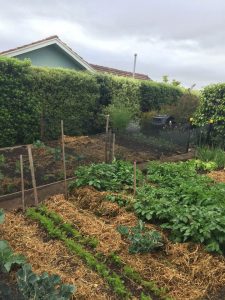
A Healthy, Nutritious Diet Helps to Support Your Immune System
All around the world people’s lives are being severely impacted by COVID-19. On the 20th of March, Dr.Tedros Adhanom Ghebreyesus (who is the Director-General of World Health Organisation (WHO)) advised people to maintain a robust immune system. He said “First, eat a healthy and nutritious diet, which helps your immune system to function properly.”
Many of our program partners have had to close the door on their organisations as they’ve been put into lockdown. Our program partner in the Philippines – The Muravah Foundation has said, “We’re in lockdown and taking the opportunity to get all our team building home vegie gardens. With so many out of work and no safety net they are getting hungry so there’s our catalyst for change.” In very little time some plants will have grown and be producing food for them. Now more than ever local food plants have a key role to play in our diet.
Quite possibly there are people in your community who are wondering how they are going to feed themselves and their families because of COVID-19. By growing some of their own food it will give people something positive to engage in, and importantly, nutritious food. For those who have lost employment, this helps to give them something immediately to focus on and in very little time they can be benefiting from their effort. What’s more, gardening is proven to be good for our mental health, which is understandably a huge issue at the moment.
We can provide a soft leaflet for you to print and distribute that is specific to the region you live in. It would contain the following information:
- 15 edible plants (3 from each of the major food groups), that are known to grow in your area, that are high in the most beneficial nutrients.
- Each plant will have information including:
- Common name
- Scientific name
- Key points regarding use
- Key points regarding cultivation
- Information on nutrients and why they are important.
- Information on how to start a garden.
- Each plant will have information including:
This leaflet would then allow anybody to start their own garden, whether it be one pot in an apartment, or turning over some lawn in their yard. For very little effort, it could have such a positive impact.
Eating a balanced diet is vital for our health and well-being. Food provides our bodies with the energy, proteins, vitamins, and minerals to live, grow, and stay active. We need a wide variety of different foods to provide the right amounts of nutrients to live healthy and productive lives.
Please contact us for more detail: info@foodplantsolutions.org

The Importance of Local Food Plants – Bruce French AO
Good nutrition can help reduce disease and infections, my heart still aches for the over 6 million children worldwide each year who don’t live long enough to get to school, due to under-nutrition. (And another 6 million die from disease.) On a visit to a hospital in the highlands of Papua New Guinea as a part of a nutrition course I was doing over 45 years ago, I saw about 28 children dying of malnutrition and this was enough motivation for me to think someone should do something.
Over the years I have had top scientists tell me I was wasting my life documenting local less well-known plants because to build a career I need to specialise with one variety of one well known plant. So, as the majority of non-commercial horticulturalists and scientists are now calling for the re-discovery of well adapted and highly nutritious local plants, I feel gratified. At last they are realising that sustainable food production and good nutrition and feeding an increasing world population requires a more soundly agro-ecological approach. So I feel that my 50 years of plodding has been worth it to now end up with the world’s most comprehensive database on the amazing food plant options available free to all. I have read a multitude of scientific reports and articles that say this is the only way for the future of the planet and we need to re-think our whole approach to agriculture.
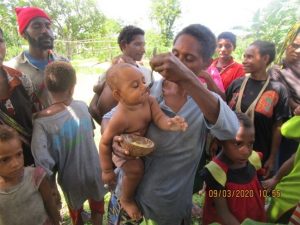
Alleviation of Malnutrition in PNG – Global Grant Update – Dr Russ Stephenson
The two week field work I undertook in February / March included the following:
Small Village Business Workshop
The first 4 days at Mougulu was spent running a workshop on planning a small village business in PNG. With 41 participants, their understanding varied greatly from those who clearly benefited, to those who were greatly challenged by the topics. A onde day follow-up course will be held later this year.
Distribution of project books
After the small business workshop i set about dividing the project bookletsp into village groups. Each family in the region is to receive the main project booklet that has an attractive coloured cover and includes all lessons taught during the workshops. It is designed as an on-going reference book that I hope will enhance sustainability of the project. Each family (ca 2,000) will also receive a small notes of growing nutritious food in village home gardens, again as a reference to lessons and establishment of demonstration gardens.
Suabi Village Nutrition Workshop
My next task was a visit to Suabi village where I spent 5 nights. I ran the nutrition workshop to over 50 families over 2 and a half days, followed by lessons on how to grow more nutritious food in village gardens and preparing a demonstration garden of corn, beans and peanuts. The villagers worked hard on this, finishing just before dark. I gave each family who had worked on the demonstration gardens seeds of snake bean and peanut so they could grow more nutritious beans and peanuts in their gardens.
Practical, hands-on preparation of nutritious baby foods
At this workshop we discussed babies requirements for nutritious food when they start eating solids at 6 months. At present, mothers will chew cooking banana, for example, and then take the chewed up food and place it in the baby’s mouth. This weak energy food is not the best nutritional option. Together we prepared foods using fresh available produce and dry staple foods, and from that created nutritious high energy porridges. The babies who ate all this nutritious food loved it all, coming back time and again for more.
During the food preparation session, we also showed how pumpkin seeds can be collected, sun dried and then dry fried to make a very nutritious snack food, utilising a valuable food that is now either thrown away or fed to the pigs. Pumpkin seed kernels contain over 10 times the energy of staple foods!
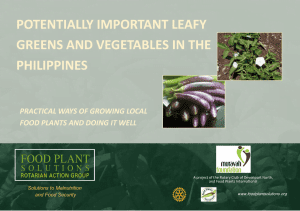
District 9830 Support for FPS Assists Rwanda
Our district (9830) provided a grant of $2800 to Food Plant Solutions, which was used to create a much needed publication for our program partner in Rwanda – The Mustard Seed Institute. Upon receipt of the publication, The Mustard Seed Institute said:
“On Behalf of The Mustard Seed Institute (MSI) and the community of Rwankuba, I would like to thank you very much for supporting the creation of ‘Leafy Greens and Vegetables’ booklet. This publication will be of great benefit to our community. We are based in Rwankuba Village in the Eastern Province of Rwanda, our community is very poor and survives on subsistence agriculture, there are significant problems with malnutrition within the community. This booklet will help the Mustard Seed Institute to educate the community about nutrition and growing a range of vegetables in their garden plots. We know that with the help of Food Plants Solutions and their publications we will be able to improve the health and wellbeing in our community and see the children flourish.
Thank you for your generosity, your support helps to transform lives, Many Thanks, Best Wishes”
Food Plant Solutions is most grateful for the support it receives from District 9830 and the clubs within it.
Editor’s Note
For many of us it’s a challenging time and for some of us, it will be very tough. To each of you, stay safe and be sure to reach out if you are feeling a bit blue; it’s understandable and it’s ok.

